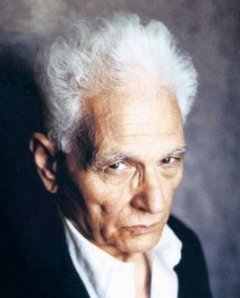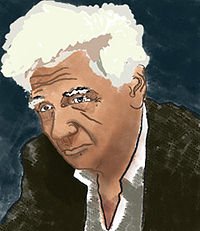Striking Quotes From Jacques Derrida

Hi everyone,
I wanted to share with you some striking quotes from Jacques Derrida, which I noted as I read his works. Please enjoy and you're more than welcome to the comment section for discussing further on these quotes!
If this is so, the entire history of the concept of structure, before the rupture of which we are speaking, must be thought of as a series of substitutions of center for center, as a linked chain of determinations of the center. Successively, and in a regulated fashion, the center receives different forms or names. The history of metaphysics, like the history of the West, is the history of these metaphors and metonymies. Its matrix . . . is the determination of Being as presence in all the senses of this word. It would be possible to show that all the names related to fundamentals, to principles, or to the center have always designated an invariable presence—eidos, arche, telos, energeia, ousia (essence, existence, substance, subject) aletheia, transcendentality, consciousness, God, man, and so forth (Derrida, Writing and difference, 279-80).
To take one example from many: the metaphysics of presence is shaken with the help of the concept of sign. But, as I suggested a moment ago, as soon as one seeks to demonstrate in this way that there is no transcendental or privileged signified and that the domain or play of signification henceforth has no limit, one must reject even the concept and word “sign” itself—which is precisely what cannot be done. For the signification “sign” has always been understood and determined, in its meaning, as sign-of, a signifier referring to a signified, signifier different from its signified (Derrida, Writing and difference, 281).
There is no sense in doing without the concepts of metaphysics in order to attack metaphysics. We have no language—no syntax and no lexicon—which is foreign to this history (Derrida, Writing and difference, 280).
Deconstruction is not a form of textual vandalism designated to prove that meaning is impossible . . . The deconstruction of a text does not proceed by random doubt or generalized skepticism, but by the careful teasing out of warring forces of signification within the text itself. If anything is destroyed in a deconstructive reading, it is not meaning but the claim to unequivocal domination of one mode of signifying over another. This, of course, implies that a text signifies in more than one way, and to varying degrees of explicitness . . . “The reading must always aim at a certain relationship, unperceived by the writer, between what he commands and what he does not command of the patterns of the language that he uses. This relationship is not a certain quantitative distribution of shadow and light, of weakness or of force, but a signifying structure that the critical reading should produce” (p. 158; emphasis in original). In other words, the deconstructive reading does not point out the flaws or weaknesses of stupidities of an author, but the necessity with which what he does see is systematically related to what he does not see (Johnson, “Translator's Introduction,” in Dissemination, by Derrida, xiv-xv).
The semiological or, more specifically, linguistic "science" cannot therefore hold on to the difference between signifier and signified-the very idea of the sign-without the difference between sensible and intelligible, certainly, but also not without retaining, more profoundly and more implicitly, and by the same token the reference to a signified able to "take place" in its intelligibility, before its "fall," before any expulsion into the exteriority of the sensible here below. As the face of pure intelligibility, it refers to an absolute logos to which it is immediately united (Derrida, Of Grammatology, 13).
Thus, within this epoch, reading and writing, the production or interpretation of signs, the text in general as fabric of signs, allow themselves to be confined within secondariness. They are preceded by a truth, or a meaning already constituted by and within the element of the logos. Even when the thing, the "referent," is not immediately related to the logos of a creator God where it began by being the spoken/thought sense, the signified has at any rate an immediate relationship with the logos in general (finite or infinite), and a mediated one with the signifier, that is to say with the exteriority of writing (Derrida, Of Grammatology, 14-5).
If, for Aristotle, for example, “spoken words are the symbols of mental experience and written words are the symbols of spoken words” (De interpretatione, 1, 16a 3), it is because the voice, producer of the first symbols, has a relationship of essential and immediate proximity with the mind. Producer of the first signifier, it is not just a simple signifier among others (Derrida, Of Grammatology, 11).
Saussure says: “Language and writing are two distinct systems of signs; the second exists for the sole purpose of representing the first” (p. 45; italics added) [p. 23]. . . . “The linguistic object is not defined by the combination of the written word and the spoken word: the spoken form alone constitutes the object” (p. 45; italics added) [pp. 23-24] (Derrida, Of Grammatology, 30-1).
Writing will be “phonetic,” it will be the outside, the exterior representation of language and of this “thought-sound.” It must necessarily operate from already constituted units of signification, in the formation of which it has played no part. (Derrida, Of Grammatology, 30-1).
Writing is nothing but the representation of speech; it is bizarre that one gives more care to the determining of the image than to the obiect (J.-J. Rousseau, Fragment inedit d'un essai sur les langues) (Derrida, Of Grammatology, 27).
Forgetfulness because it is a mediation and the departure of the logos from itself. Without writing, the latter (speech) would remain in itself. (Derrida, Of Grammatology, 37).
The trace is in fact the absolute origin of sense in general. Which amounts to saying once again that there is no absolute origin of sense in general. The trace is the differance which opens appearance [l'apparaître] and signification. (Derrida, Of Grammatology, 65).

REFERENCES
Derrida, Jacques. Dissemination, trans. Barbara Johnson. Chicago: The University of Chicago
Press, 1981.
Derrida, Jacques. Of grammatology, cor. ed., trans. Gayatri Chakravorty Spivak. Baltimore: The
John Hopkins University Press, 1997.
Derrida, Jacques. Writing and difference, trans. Alan Bass. Chicago: The University of Chicago
Press, 1978.